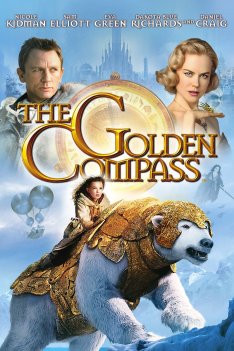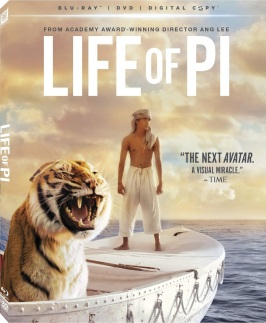MAY 29, 2013 SCREENING: THE GOLDEN COMPASS (2007)
The Golden Compass has a strange little irony in it. This is a fantasy film that couldn’t be more different than the one I previous screened (Inkheart) aside from the fact they’re both based on popular fantasy novels and the protagonist in each is a 12 year old British girl. However, the end result is pretty much the same: the film adaptation itself is well made and enjoyable, but ultimately underwhelming. I found it odd how they both ended up that way for very different reasons.
Apparently the “controversy” behind the original source material is that its viewed in much the same way as The Da Vinci Code: critics have charged that the book is a hit piece on organized religion in general, and specifically on the Catholic Church. Again, however, the similarities diverge there. While The Da Vinci Code didn’t shy away from the controversy and was ultimately a big financial hit, The Golden Compass departed significantly from its source material and denied there was any religious allegory in the film, and it did only modestly well.
Not being familiar with the controversy prior to watching the movie, I didn’t see anything clearly anti-Catholic in the movie. There is the basic premise of an evil organization in this fantasy world known as “The Magisterium” that controls everyone and censors things ruthlessly, but they bore little resemblance to the actual “Magistarium” in Catholicism aside from the name, so I didn’t connect the two in my mind. What I noticed more was the very solid special effects ultimately came across as unintentionally funny in the way they were used. In this world, all the animals talk. The film makes it so non-chalant that various animals routinely behave like normal beasts, then casually strike up a conversation with a human being, and the human characters don’t blink an eye but chat with the animal exactly as they would with another person. Of course, talking animals is a common theme of childrens literature, and probably worked fine in the book. It’s just strange on screen since the animals don’t otherwise exhibit any anthropomorphic human traits, and literally all of them (raccoons, polar bears, insects, etc.) are quite talkative while they’re engaged in everyday animal tasks (finding acorns, digging burrows, etc.) One of the more exciting scenes is when the girl hitches a ride across the arctic on a polar bear.
The child actors in this movie were very engaging in their roles, although I can’t really say the same for most of the adult actors, despite that fact that many of them are A-list Hollywood stars. Nicole Kidman has an annoying habit of whispering all her lines in every movie she’s made for the last 10 years, Sam Elliot behaves exactly like you’d expect if you’ve ever seen a Sam Elliot movie (even in this fantasy world, his character is still from Texas), Daniel Craig is okay, and Eva Green is just bland as an evil witch (though in fairness to her, she has to compete with all the memorable witches from fantasy films like The Chronicles of Narnia and The Wizard of Oz)
Going back to watch the trailer for this movie, it’s a great deal more exciting than the movie itself. The remake of Clash of the Titans had the same problem. In both cases, if the trailer was the movie, it easily gets three stars, but unfortunately the movie itself isn’t as good. The ultimate irony is that while The Da Vinci Code got negative reviews and The Golden Compass got fairly good viewers, the Da Vinci Code proved to be much more successful is appealing to adult audiences, that The Golden Compass was to children. Since both films were harshly attacked for having an “hidden agenda” of bashing Catholicism, I can’t say the reason why The Golden Compass isn’t getting a sequel is because the Catholic League and the United States Conference of Catholic Bishops didn’t like it. More likely, it just wasn’t as compelling as it could have been.
** ½ out of ****


